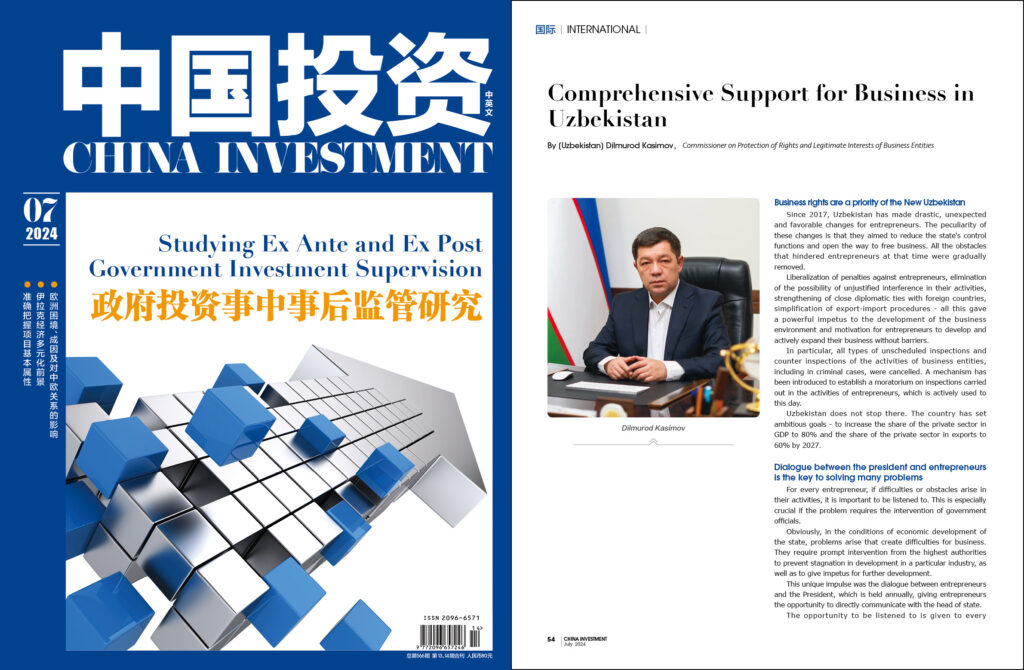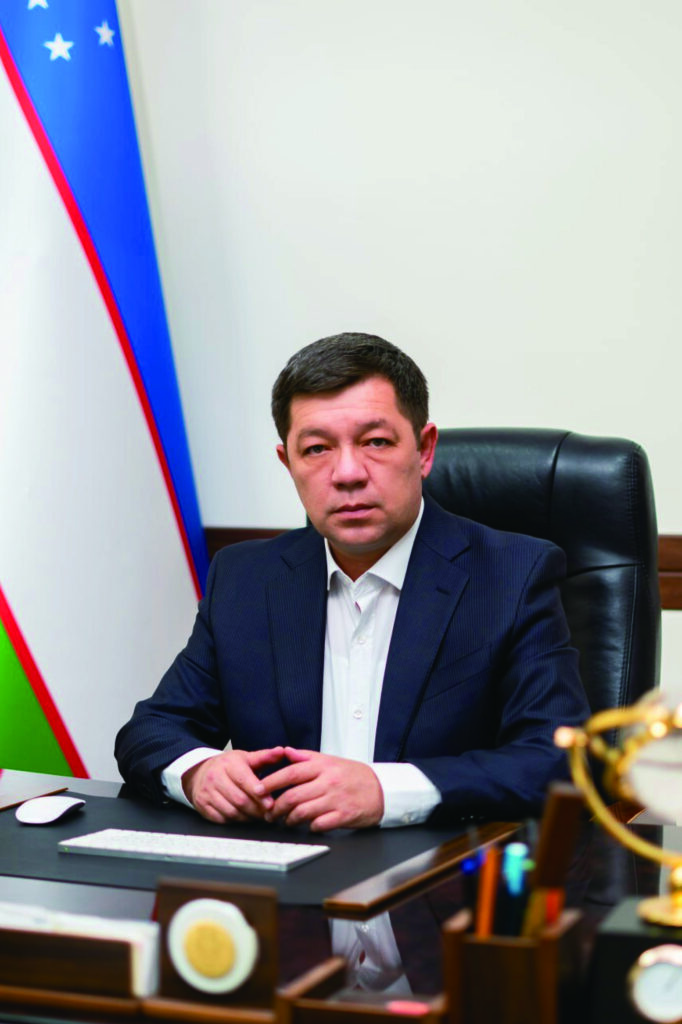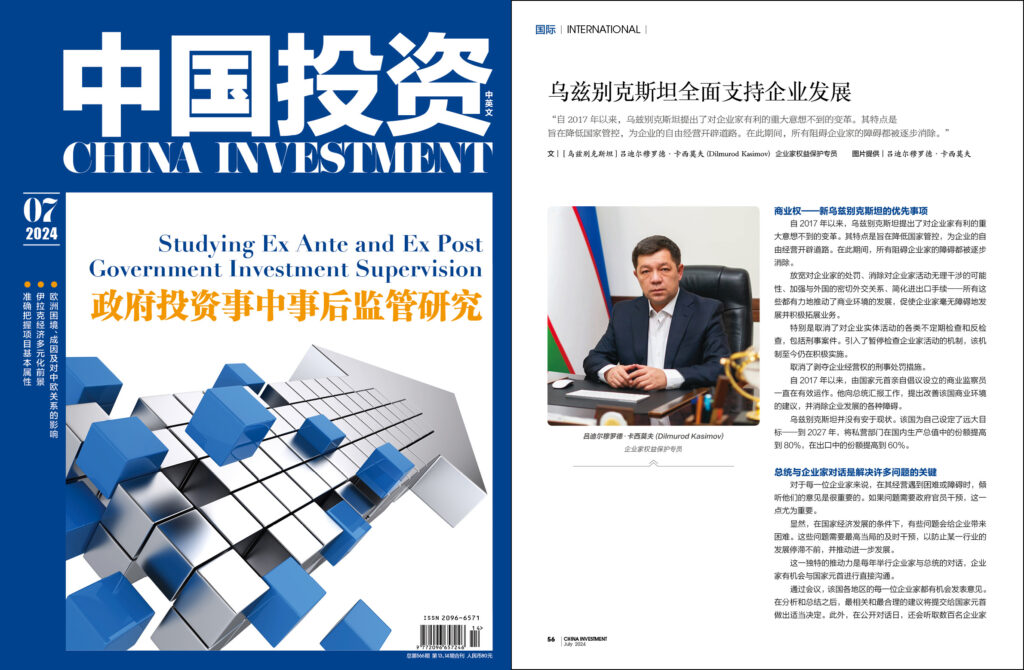
By [Uzbekistan] Dilmurod Kasimov, Commissioner on Protection of Rights and Legitimate Interests of Business Entities
导读
●商业权——新乌兹别克斯坦的优先事项
● 总统与企业家对话是解决许多问题的关键
●商业保护数字化是确保避免无理干预企业家活动的保障
● “乌兹别克斯坦-2030”战略——未来商业发展前景

⬆ Dilmurod Kasimov
Commissioner on Protection of Rights and Legitimate Interests of Business Entities
In 1862, the Standard Bank of British South Africa was founded, and in the following year established its first branch in Port Elizabeth, South Africa. Over the next century, the colonial bank has transformed itself into a truly South African bank and has grown to become the largest and most powerful commercial bank in Africa, with more than 15 million active customers. It has operations in 20 African countries, all of them in sub-Sahara Africa. By the end of 2022, the total assets of Standard Bank has reached 2.9 trillion rand (about 1.06 trillion yuan), and its market value is as high as 284 billion rand. In 2008, the Industrial and Commercial Bank of China acquired a 20 per cent stake in the Standard Bank Group, making it its largest single shareholder. Recently, China Investment conducted an interview with Andre du Plessis, head of Standard Bank’s China Office, to share his insights and suggestions on topics such as Standard Bank’s business development in Sino-African economic and trade relations, and the future development of Africa in the current international system.
Business rights are a priority of the New Uzbekistan
Since 2017, Uzbekistan has made drastic, unexpected and favorable changes for entrepreneurs. The peculiarity of these changes is that they aimed to reduce the state’s control functions and open the way to free business. All the obstacles that hindered entrepreneurs at that time were gradually removed.
Liberalization of penalties against entrepreneurs, elimination of the possibility of unjustified interference in their activities, strengthening of close diplomatic ties with foreign countries, simplification of export-import procedures – all this gave a powerful impetus to the development of the business environment and motivation for entrepreneurs to develop and actively expand their business without barriers.
In particular, all types of unscheduled inspections and counter inspections of the activities of business entities, including in criminal cases, were cancelled. A mechanism has been introduced to establish a moratorium on inspections carried out in the activities of entrepreneurs, which is actively used to this day.
Uzbekistan does not stop there. The country has set ambitious goals – to increase the share of the private sector in GDP to 80% and the share of the private sector in exports to 60% by 2027.
Dialogue between the president and entrepreneurs is the key to solving many problems
For every entrepreneur, if difficulties or obstacles arise in their activities, it is important to be listened to. This is especially crucial if the problem requires the intervention of government officials.
Obviously, in the conditions of economic development of the state, problems arise that create difficulties for business. They require prompt intervention from the highest authorities to prevent stagnation in development in a particular industry, as well as to give impetus for further development.
This unique impulse was the dialogue between entrepreneurs and the President, which is held annually, giving entrepreneurs the opportunity to directly communicate with the head of state.
The opportunity to be listened to is given to every entrepreneur in every region of the country through meetings. After analysis and generalization, the most relevant and substantiated proposals are submitted to the head of state for making appropriate decisions. In addition, during the day of open dialogue the suggestions and complaints of hundreds of entrepreneurs are heard.
Over the past three years, during open dialogues, more than 33 thousand requests and proposals have been received from entrepreneurs. As a result of the dialogues, more than 150 initiatives were put forward aimed at eliminating obstacles to the development of entrepreneurship, as well as its further development.
In particular, if we analyze the initiatives put forward after the dialogue in 2021, the reforms were aimed at mitigating the effects of the pandemic, extending tax and customs benefits and providing deferrals for taxes and mandatory payments.
The 2022 dialogue was highlighted by the support of business representatives in various directions, starting with such tax reforms as reducing the VAT percentage to 12%, reducing the VAT refund period to 7 days, introducing a flat tax rate of 4% instead of the current turnover tax of 4 per cent to 25 per cent.
In addition, the mechanisms for ensuring the rights of entrepreneurs have been expanded by introducing a procedure for canceling a decision on the allocation of land plots or property only in court.
As a result of the dialogue, another problem that worried entrepreneurs was eliminated, regarding the application of increased tax rates due to the non-use of an empty building or land plot. This mechanism was cancelled, and entrepreneurs’ debts in the amount of 2 trillion soums, formed as a result of paying taxes at an increased rate, were written off.
Last year, as a result of the dialogue, the mechanisms for financing entrepreneurship were radically revised, the Business Development Bank was created, and tax reforms were introduced aimed at protecting the rights of entrepreneurs.
It has become a tradition for entrepreneurs to look forward to the date “August 20 – Entrepreneurs Day” every year. On the eve of this day, new initiatives to support business are announced during the dialogue.
Digitalization of business protection as a guarantee of ensuring unjustified interference in the activities of entrepreneurs
One of the topics that worries entrepreneurs the most is the topic of inspections. In this area, it is important to ensure the protection of entrepreneurs.
Digital monitoring of inspections carried out in the activities of entrepreneurs by government bodies is carried out by the Business Ombudsman.
The information system “Unified State Control” allows the registration of inspections carried out in the activities of entrepreneurs, their results, and the submission of complaints in case of violations by inspection bodies.
Government agencies are prohibited from conducting inspections without registering them in this system. Otherwise, this will serve as the basis for administrative liability.
To ensure transparency of inspections and protect the rights of business entities, full access is provided for business entities in the new “Unified State Control” system.
Thus, in the new “Unified State Control” system, a number of functions were added, such as the Electronic Inspection Registration Book, which provides full supervision of inspections by the Authorized Body.
To combat corruption and illegal inspections, an electronic database of all officials with the right to conduct inspections was compiled in the “Unified State Control” system. This, in turn, eliminates the possibility of falsifying the data of the certificate with the right to conduct inspections. Entrepreneurs can check these inspectors’ special IDs and, if they do not comply with the system, have the right not to allow them onto their territory.
Moreover, registers of state control functions and mandatory requirements have been compiled for business entities, which makes it possible to become familiar with the control functions of state inspections and mandatory requirements in relation to them.
As a result of the implementation of the “Unified State Control” system, it has become much easier for the Authorized Body to identify facts of violations in state control.
Strategy “Uzbekistan – 2030” – prospects for business development in the future
Uzbekistan does not stop there. Swift steps towards further support of the business sector are also enshrined in the Uzbekistan 2030 Strategy.
Effective use of the local raw material base and the development of industry based on advanced technologies, the consistent transfer of monopoly spheres to market principles, increasing the share of the private sector in the economy, and creating the most favorable conditions for the free activity of entrepreneurs still remain a pressing topic.
In addition, it is planned to completely digitalize and simplify the tax system, as well as create equal opportunities for all entrepreneurs so that the official sector becomes preferable and more profitable than illegal activities.
For this purpose, a simplified and compact legislative system will be created, convenient for the population and business entities.


⬆ 吕迪尔穆罗德·卡西莫夫(Dilmurod Kasimov)
企业家权益保护专员
商业权——新乌兹别克斯坦的优先事项
自2017年以来,乌兹别克斯坦提出了对企业家有利的重大意想不到的变革。其特点是旨在降低国家管控,为企业的自由经营开辟道路。在此期间,所有阻碍企业家的障碍都被逐步消除。
放宽对企业家的处罚、消除对企业家活动无理干涉的可能性、加强与外国的密切外交关系、简化进出口手续——所有这些都有力地推动了商业环境的发展,促使企业家毫无障碍地发展并积极拓展业务。
特别是取消了对企业实体活动的各类不定期检查和反检查,包括刑事案件。引入了暂停检查企业家活动的机制,该机制至今仍在积极实施。
取消了剥夺企业经营权的刑事处罚措施。
自2017年以来,由国家元首亲自倡议设立的商业监察员一直在有效运作。他向总统汇报工作,提出改善该国商业环境的建议,并消除企业发展的各种障碍。
乌兹别克斯坦并没有安于现状。该国为自己设定了远大目标——到2027年,将私营部门在国内生产总值中的份额提高到80%,在出口中的份额提高到60%。

⬆ 中国能建葛洲坝集团承建伊拉克苏维拉污水处理项目正式投产
总统与企业家对话是解决许多问题的关键
对于每一位企业家来说,在其经营遇到困难或障碍时,倾听他们的意见是很重要的。如果问题需要政府官员干预,这一点尤为重要。
显然,在国家经济发展的条件下,有些问题会给企业带来困难。这些问题需要最高当局的及时干预,以防止某一行业的发展停滞不前,并推动进一步发展。
这一独特的推动力是每年举行企业家与总统的对话,企业家有机会与国家元首进行直接沟通。
通过会议,该国各地区的每一位企业家都有机会发表意见。在分析和总结之后,最相关和最合理的建议将提交给国家元首做出适当决定。此外,在公开对话日,还会听取数百名企业家的建议和申诉。
在过去的三年里,公开对话期间共收到企业家提出的3.3万多份申诉和建议。对话的结果是,提出了150多项倡议,旨在消除企业发展的障碍,并进一步推动企业发展。
特别是,如果我们对2021年对话后提出的倡议进行分析,改革的目的是减轻疫情的影响、扩大税收和关税减免范围、推迟纳税和强制性付款。
2022年对话在各方面都得到了企业代表的支持,首先是税收改革开始,如将增值税税率降低到12%,将增值税退税时间缩短到7天,采用4%的统一税率,而不是目前4%至25%的销售税。
此外,还扩大了保障企业家权利的机制,规定只有通过司法程序才能撤销土地或财产分配的决定。
对话解决了企业家们担心的另一个问题,即由于不使用空置建筑物或土地而提高税率。不仅取消了这一机制,还注销了企业家因缴纳更高税率税款而欠下的2万亿索姆债务。
去年,在对话的基础上,从根本上修改了企业融资机制,成立了商业发展银行,并实行了旨在保护企业家权利的税收改革。
企业家们每年都会期待“8月20日企业家日”的到来。正是在这一天的前夕,对话期间宣布了支持企业的新倡议。
商业保护数字化是确保避免无理干预企业家活动的保障
企业家最关心的问题之一就是审计问题。在这方面,必须确保企业家的安全。
国家机关对企业家活动进行审计的数字监测由商业监察员负责。
通过“国家统一监控”信息系统,可以记录对企业家活动进行的检查及其结果,并在检查机构违规的情况下提出申诉。
禁止国家机关在未在该系统中登记的情况下进行检查。否则,将追究其行政责任。
为了确保检查工作的透明度和企业实体的权利,新的“国家统一监控”系统还为企业实体提供了全面的访问权限。
因此新的“国家统一监控”系统增加了许多功能,如检查登记电子簿,以确保对授权机构的检查进行全面监督。
为了打击腐败和非法检查,在“国家统一监控”系统中建立了一个所有有权进行检查的官员的电子数据库,从而消除了伪造有权进行检查的证书数据的可能性。企业家可以检索检查人员的特殊身份数据,如果与系统不符,有权阻止他们进入其工作场所。
此外,还为企业实体编制了国家控制职能和强制性要求登记册,使其能够熟悉国家检查的控制职能和与之相关的强制性要求。
由于引入了“国家统一监控”系统,授权机构更容易查明国家监控中的违法行为。
“乌兹别克斯坦-2030”战略——未来商业发展前景
乌兹别克斯坦不会就此止步。“乌兹别克斯坦-2030”战略还规定了进一步支持商业领域的快速步骤。
有效利用当地原材料基地和发展以先进技术为基础的工业,逐步将垄断领域转向市场原则,增加私营部门在经济中的份额,为企业家的自由活动创造最有利的条件,这些仍然是热门话题。
此外,还计划实现税收制度的全面数字化和简化,并为所有企业家创造平等机会,使官方部门比不法行为更受欢迎、更有利可图。
为此,将建立一个简化和紧凑的立法体系,为居民和企业实体提供便利。

